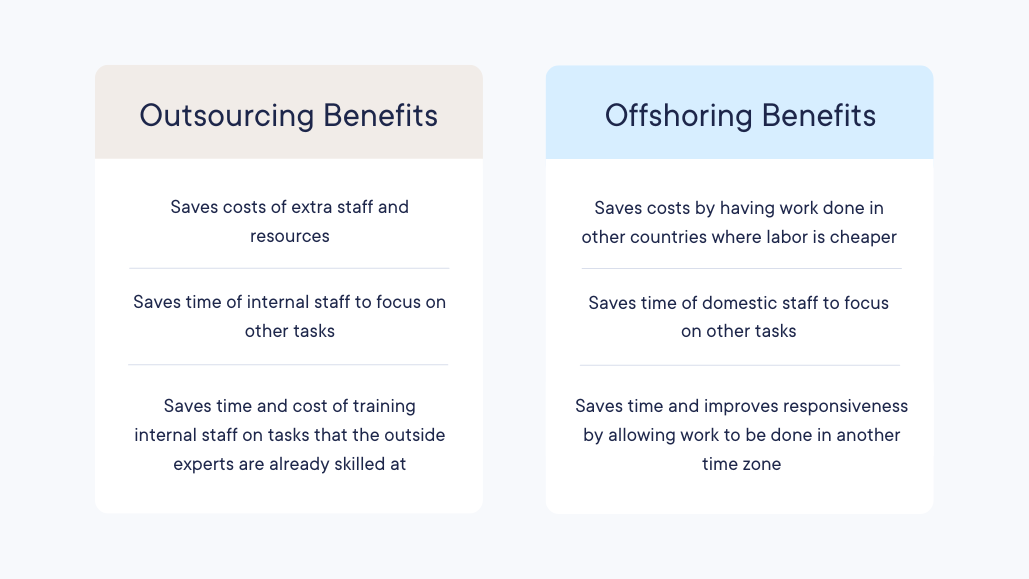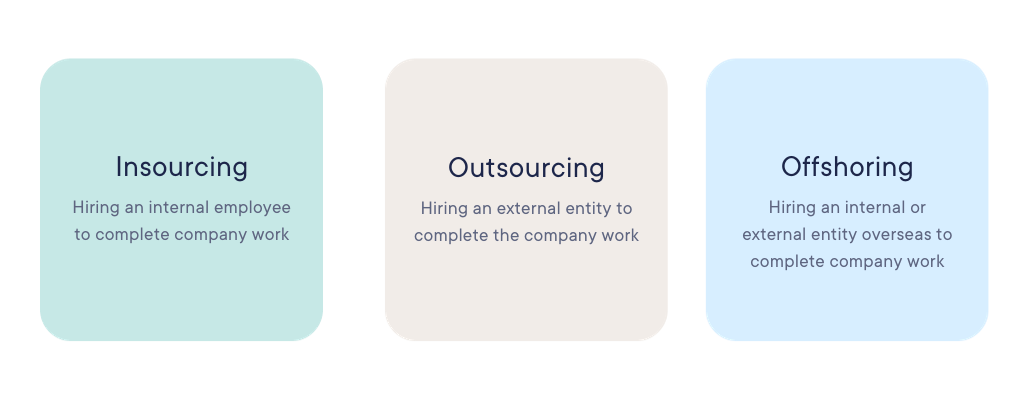
Outsourcing vs Offshoring: A Comprehensive HR Analysis of Advantages and Disadvantages
December 25, 2023 Written by Rebecca Ahn

Compare Providers
Download our outplacement comparison sheet
Request Pricing
Compare our rates to other providers
In today’s economy, it often makes sense for your business to explore the idea of outsourcing vs offshoring different parts of your business.
Before you make a decision to outsource or offshore, it is vital that you understand the differences between these two options and the advantages and disadvantages of each. This will help you choose the best strategy for your company.
In this article, we will dissect and compare the many aspects of these two paths, including:
- The differences between outsourcing and offshoring
- Outsourcing vs offshoring examples
- The benefits of outsourcing and offshoring
- Offshoring and outsourcing advantages and disadvantages
- How to make the right decision for you
What is the Difference Between Outsourcing and Offshoring?
Let’s start with understanding “outsourcing.” This refers to the process of having someone external to your company, that is not an employee, complete a task or business process for your company. This could be an outsourcing agency or a consultant.
On the flip side, “insourcing” refers to the process of having an internal employee of your company complete the task or business process.
Now let’s add “offshoring” into the mix. “Offshoring” is like outsourcing in many ways. It involves taking a process or function of your business and paying another entity to do that work for you. The main difference is that when you offshore that work, the entity you are paying to do those tasks is located overseas. Hence the term “offshore.”
That said, offshoring doesn’t necessarily require the hiring of an external party to conduct that part of the business on behalf of the company. It can also mean merely moving part of the business or operations of the company to a new office or branch in another country. In other words, the other entity being paid to do this work would be internal within the company, just in another country. This would be called “internal offshoring.”
Now if that company hired an external entity located in another country to complete those company tasks or processes, this would be a case of both outsourcing AND offshoring, otherwise known as “offshore outsourcing.”
Let’s lay this out in a side-by-side chart to help sum up these insourcing vs outsourcing vs offshoring distinctions.
Now that we’ve established these basic definitions, let’s look at some real-world examples of how companies apply these strategies to their business operations.
Outsourcing vs Offshoring Examples
To help paint this picture more clearly, let’s discuss a few examples of outsourcing vs offshoring. Say, for example, that you have a lot of accounting work that needs to be done at your organization. You could hire an employee internally to handle your accounting and bookkeeping, or you could outsource it to a company that specializes in doing these tasks. This is an excellent and very common example of the choice between insourcing and outsourcing.
Now let’s say the outside accounting firm you want to hire is based in another country. Or how about another scenario where you want to hire a factory in China to manufacture a tech gadget for you. Or maybe you are looking to offshore your Spanish language marketing materials to a marketing agency in Latin America. All of these would be examples of offshoring, as well as outsourcing, which is often referred to as “offshore outsourcing.”
To take the first example in another direction, let’s say you want to keep your accounting and bookkeeping in-house, but want to move it overseas to another country in a much different time zone, allowing that work to be completed in a more timely and cost-effective manner. So you open an office in that country and hire internal staff to do this work from there. This would be an example of “internal offshoring.”
Another common example that’s applicable to this discussion is hiring an outside firm to provide outplacement services to your impacted employees in a layoff or reduction in force (RIF) event. Once again, the distinction between outsourcing and offshoring here would depend on whether or not that external provider is located in another country. Of course, when it comes to outplacement, it’s rather important for the provider to understand the local job market where your employees are searching for their new employment. So offshoring to an overseas firm would not be as helpful as outsourcing to a more local outplacement firm.
That said, you may want to look for an outplacement firm that provides global outplacement reach and support, in addition to local expertise, if your impacted employees and offices are dispersed across different locations and countries. This would not necessarily be considered offshoring, depending on where the global outplacement firm is primarily based, but it’s good to keep in mind all the same.
The Benefits of Outsourcing and Offshoring
Now that you understand the core differences between outsourcing vs offshoring, it’s important that you understand why making the right decision between these two options is so vital, and how taking advantage of either option–or both–can have a lot of benefits for your organization.
Whether you choose to outsource and offshore your business processes, both come with some general benefits that apply in either scenario. Both would help reduce costs for your organization by finding more cost-effective and specifically skilled workers to complete the tasks in question. They would both also free up the workload of your local internal staff, giving them more time to focus on other parts of the business.
Beyond these common benefits, there are a few upsides unique to outsourcing vs offshoring. Outsourcing is primarily about optimizing the expertise of a company’s workforce, using outside experts where needed beyond the skills of the internal staff, and refocusing the strengths of those internal staff where they are strongest.
To use the examples from earlier, this is a perfect explanation for the benefits of outsourcing your outplacement. Doing so allows your internal HR staff to focus on other, more strategic areas of human resources while the external outplacement firm provides highly specialized, expert outplacement support to your impacted employees.
In contrast, offshoring is more focused on optimizing the reach and locale of a company’s workforce by moving part of the business to an entity located in another country–whether internal or external–that’s able to provide more timely and efficient support. This could be in order to be closer to customers located there, or enable that part of the business to operate in another time zone while the domestic office is offline.

Either way, both options can significantly improve the efficiency, skill, and cost-savings of your workforce. But there are some big differences to consider. Whichever one you choose could be the reason that your business grows at an exponential rate, or saves your company from going under. However, it could also be the reason that your company struggles or even goes out of business. So it’s important to consider these benefits, as well as their challenges, very carefully when making your decision.
Let’s dive into these unique differences a bit further to compare both the advantages and disadvantages of outsourcing vs offshoring.
Offshoring and Outsourcing Advantages and Disadvantages
Let’s take a look at the upsides and downsides of choosing either of these options. These will vary somewhat depending on which business processes or tasks you are considering. But there are still helpful pros and cons to keep in mind that generally apply in most situations.
Outsourcing Advantages and Disadvantages
The distinction is pretty clear when you’re considering outsourcing vs insourcing. You will find that, in this case, the positives and negatives are essentially inverses of one another.
- Less control and limited flexibility
Insourcing lets you have more control, allows your employees to feel more ownership, and provides you with more customization and flexibility for quick changes. Meanwhile, outsourcing firms most likely won’t offer those abilities.
- Lower employee pride or ownership
For one thing, the employees of the outsourcing firm might not take as much pride in the work they do for your company as your internal employees would. This is because it ultimately isn’t your company they feel loyalty to. If you find a really great outsourcing firm with extra focus on customer satisfaction, this might not be the case. But it is very likely to be most of the time.
- Reduced responsiveness and customization
The outsourcing firm will also have many clients besides you. So they won’t have the same capacity to quickly respond to changes or customize a process just the way your business prefers. Every outsourcing firm is different, but this can often be a problem for outsourcing certain business processes that require a lot of responsiveness and adaptability.
That said, insourcing also has its downfalls. The cost, amount of training required, and issues with scalability can easily get out of control if your company is growing very rapidly. This is where outsourcing wins the insource vs outsource debate.
- Cost containment and scalability
Outsourcing is a great option for containing costs over the long run. Outsourced entities are capable of scaling much more easily than insourced staff because of the amount of resources that they have on hand. Taking on 20 additional hours of work each week won’t phase your outsourced company, but it would put a huge strain on your internal employees.
- No internal training required
Outsourcing companies are also responsible for their own training. So when you need to get something else done, you won’t have to worry about the ramp-up time to onboard a new person for that task.
- Access to expert-level knowledge
Since the external company you outsource to specializes in that specific business process or task, they usually also come with relevant expert level knowledge. Hiring someone with this level of skill at your organization might be too expensive for your bottom line. So it makes sense to rely on outsourcing to a company that already has that level of expertise and experience.
If you’re still stuck on the debate between the pros and cons of outsourcing, or figuring out how you would go about implementing the right option for you, feel free to download our Decision Maker’s Guide to Outsourcing below.
Offshoring Advantages and Disadvantages
When looking at all of the offshoring advantages and disadvantages, it’s pretty easy to see why so many companies choose to offshore parts of their business.
- Cost Savings and financial advantages
The first advantage of offshoring is that the costs are generally much lower than completing the process at a facility in your domestic location. The cost of labor is often significantly cheaper at an overseas location, as well as the overhead cost of renting a facility.
This is why so many big manufacturing companies choose to locate their factories overseas. It can help increase your business profit margins, thus boosting your company’s competitiveness in the market.
In some areas of the world, your company might even be able to get a tax credit or tax break if the government in an overseas location is looking to stimulate their local economy. This can save you a substantial amount on taxes, which can be significantly higher in other parts of the world.
- Easier access to new markets
Another advantage to consider when reviewing the pros and cons of offshoring is the ability to more easily reach new markets. In an earlier example, we talked about offshoring marketing operations to a marketing agency in Latin America. This move could also help the company market their offerings to Latin America and acquire a customer base in that region. This is a great example of using offshoring to more easily reach new markets.
- Access to regional expertise
This example also shows another benefit of offshoring: expertise. If your company is located in the United States, you’re probably experts about marketing to an American audience. But you aren’t necessarily experts on the people, consumer behaviors, and other factors that come into play when trying to market your products or services to another part of the world. Offshoring allows you to hire experts in the overseas region that you want to expand your marketing to.
- Improved internal motivation and job satisfaction
Finally, offshoring also has the advantage of assisting with common human resources issues like employee motivation and job satisfaction. If your internal employees are stuck doing monotonous or time-consuming tasks in their jobs, this can prove quite demotivating for them. Especially if your employees are highly educated.
Offshoring those tasks can help improve their overall job satisfaction and, in turn, the productivity of your company. It will make your internal staff happier and free up their time for more strategic tasks, which will result in more value for your company in the long run.
Now that we’ve covered the advantages, it’s time to explore the less glamorous and gainful side of offshoring. So now let’s go over all of the disadvantages associated with offshoring.
Before your company decides to implement an offshoring strategy, it’s very important that you review the possible downsides for your particular situation, since they can have such a huge impact on your business.
- Ethical concerns regarding labor and working conditions
The first offshoring disadvantage has to do with ethics. In recent years, ethical concerns have been raised about the process of offshoring due to the low pay and poor working conditions within the factories that some companies use overseas.
In today’s hyper-connected world, it’s very easy for news of unethical worker treatment to spread online and tarnish your brand. Consumers are pickier than ever, and have proved to be willing to stop using a brand’s products because of ethical issues like this. So make sure that you take this into account when looking into offshoring, and confirm that any overseas entities you use employ safe work conditions and fair pay.
- Cultural barriers and communication challenges
The second disadvantage of offshoring has to do with cultural barriers and communication. The difference in time zones could make it difficult to communicate with your offshoring site. Decisions that would normally take one day if all parties were in the same location could now take several days, or even weeks, due to the difference in working hours.
This is just the tip of the iceberg when it comes to communication and cultural challenges. If your company and staff aren’t well versed in the culture, customs, and language of the country or region you are offshoring to, it can prove quite difficult to effectively operate your business there.
For example, it is customary in some countries to provide a gift to the head of a company before signing a new contract. If your employees don’t know this, they could blow through the potential deal and lose your chances of operating in that overseas location in the first place.
It can also be very hard to create good working relationships when you don’t speak a common language with someone. Words can get lost in translation and setbacks or mistakes can easily result. Amplify this by setting the offshoring site several thousand miles away, and managing that working relationship can become even more challenging.
- Security risks and political instability concerns
The last disadvantage of offshoring we will cover pertains to security. Let’s say you have expensive equipment at your overseas location. You will need to make sure that you maintain security onsite to ensure the safety of your machinery. Certain countries have more volatile climates and might be more susceptible to crime, violence, or political unrest. So depending on where your offshoring is located, you may want to invest in top notch security, which can add significant cost and time to manage.
Outsourcing vs Offshoring: The Comparison
Looking at the comparable list of offshoring and outsourcing advantages and disadvantages, we can more clearly see the pros and cons of taking either path.
So now let’s sum them up in a more concise side-by-side comparison in terms of how each option would impact your company’s cost, time, and operations.

Remember, this is a big decision. So all the more reason why you need to have a solid understanding of the advantages and disadvantages of either option. You need to weigh these in the context of your specific situation and business needs to see if your company would benefit more from outsourcing vs offshoring, or perhaps from a combination of both.
Outsourcing vs Offshoring: The Right Decision For You
When trying to decide between offshoring and outsourcing your business, it’s crucial that you analyze all of the pros and cons associated with the two paths.
Offshoring might be a more cost-effective option, helping you to find more affordable labor in another time zone that allows your business to reach and support customers in more regions and at all hours. This may also be the best option for augmenting your company’s expertise, if you are looking to expand into new markets in other parts of the world.
However, outsourcing can also be very helpful as a cost-effective way to bring in additional expertise, depending on the skills your business needs. It can help cut down on training costs, while preserving the time and productivity of your internal staff. It may also prove more valuable for your overall brand, if the working conditions at your outsourced entity are better than those overseas.
Whatever choice you make, always consult with your legal counsel and key stakeholders, as well as your public relations team, to understand the potential impact your decision could have on your company operations, budget, and brand.
If outsourcing is the way you choose to go, we can help with our Careerminds Outsourcing Checklist. Click below to download your free guide and get started.
In need of outplacement assistance?
At Careerminds, we care about people first. That’s why we offer personalized talent management solutions for every level at lower costs, globally.




